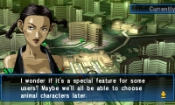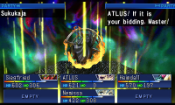Picked my copy up on Wednesday. I've only played as far as the first boss and I can't get past him yet. I've died twice which is a first for me in an SMT game and I definitely wasn't expecting demons that strong so early on.
Shin Megami Tensei: Devil Summoner: Soul Hackers Review
|
|
See PixlBit's Review Policies

On 04/19/2013 at 12:00 PM by Nick DiMola It’s all that and a bag of chips, home skillet. |

A must-buy for those who like MegaTen games or first-person dungeon crawlers.
Get ready to ride a time machine back to the ‘90s. A time when we thought the Internet was something completely different than the cesspool we know today; a time when JNCOs and flannel were acceptable clothing choices; a time when we raised the roof and exclaimed everything was “the bomb, yo!”; a time when Devil Summoner: Soul Hackers was intended to be released in America. For whatever reason, Sony rejected the title from release on the PlayStation and in Japan it remained. Until now, that is, when Atlus finally dusted it off and brought it into the future on the 3DS. The fact of the matter is that if Soul Hackers would’ve been released when intended, it would’ve been better than tight, it would’ve been straight phat, dawg.

If you haven’t guessed it already – Soul Hackers is incredibly reminiscent of the ‘90s, right down to the core theme of the game. As a part of the hacker group known as the Spookies, you’re practically a character ripped directly out of the popular 1995 movie, Hackers. As a matter of fact, you even get to choose a hacker name upon starting your quest that other members in the group refer to you as. Even better, the game features a “brand new” internet application called Paradigm X that has now been rolled out to all parts of Amani City. Basically, it’s a pseudo-virtual reality representation of the Internet a la Johnny Mnemonic.
For those that grew up during these years, it’s easy to be mentally transported back to the time when popular culture viewed the Internet in this completely unrealistic manner. Despite being a relic of that era, Soul Hackers now functions as a fantastic throwback.

What might be jarring for many is the complete shift in gameplay from what we’re used to in our modern gaming world. First and foremost, Soul Hackers is a first-person dungeon crawler, which is a huge departure from what the Devil Summoner series has come to represent in America. Rather than the Tales-esque action RPG gameplay, you’ll be crawling dungeons in classic Shin Megami Tensei fashion. Don’t worry though, the execution here is absolutely top notch and before you know it, you’re going to understand just why these types of dungeon crawlers were so prevalent in years past.
Perhaps the greatest testament to the quality of Soul Hackers is its ability to weave an incredibly complex set of gameplay systems into something that feels extremely accessible. Between the two currencies, demon negotiations, fusion, hacking, affinity, moon phases, stat building, and good old fashioned dungeon crawling, there’s a whole bunch going on simultaneously. However, these all tie so nicely into one another that you’ll progressively learn the ins and outs of each system just by virtue of playing the game and experimenting with the different choices available.

In the beginning, players are presented with a fairly easy experience. Demons are low levels and easily beaten by the two human members of your party. This makes it easy to experiment with the negotiation gameplay option that precedes any fight where you’re not ambushed. After some successful conversations, you’ll likely have a couple demons in tow that give you an edge in both future negotiations with like demons and in battle thanks to their innate abilities.
One of the most striking results of the negotiation system is the ability to eschew battles when the odds are stacked against you. After you’ve learned the right things to say to certain demons you can reduce the deadliness of a given battle by getting demons to exit the fight, or even get the fight to end entirely by receiving an item or getting a new demon to join your party. With the right tactics, you can avoid many fights in the dungeons.

Obviously, you can’t avoid all of the fights and still find success. Boss battles can be disproportionately tough and warrant not just good strategy, but a touch of grinding as well, especially if you’ve been negotiating your way out of harm. However, the negotiation tactics can at least position you to explore the game’s dungeons and find the path forward without an imminent fear of death.
Though Soul Hackers does many things right, it still has a tendency to become a bit tedious over time. The dialog and social interactions in the game are quite good, but they don’t do much to tone down the monotony of the dungeon grind. Even the game’s many layered systems eventually grow mundane after you’ve developed solid strategies to use over the course of the experience. Of course, if you don’t manage to reach a save point, you can even find yourself replaying long segments of dungeons if you die.

On a more personal note, I wanted to touch on the music in Soul Hackers. The MegaTen series is home to some of the most memorable tunes in gaming, but I didn’t feel as if Soul Hackers lived up to its namesake. Many of the in-game songs were decent, but most weren’t quite as interesting or memorable as others found in more recent games in the series. It’s not a huge problem, just a slight disappointment based on my own expectations.
All things considered, Shin Megami Tensei: Devil Summoner: Soul Hackers is a damn good game, even if it is technically 16 years old and from a dormant subgenre. It has depth without being inaccessible and makes the first-person dungeon crawler palatable for a modern generation. Whether you’re a MegaTen fan or someone who loves this old style of RPGs, you simply can’t go wrong with Atlus’ revived gem.










Comments